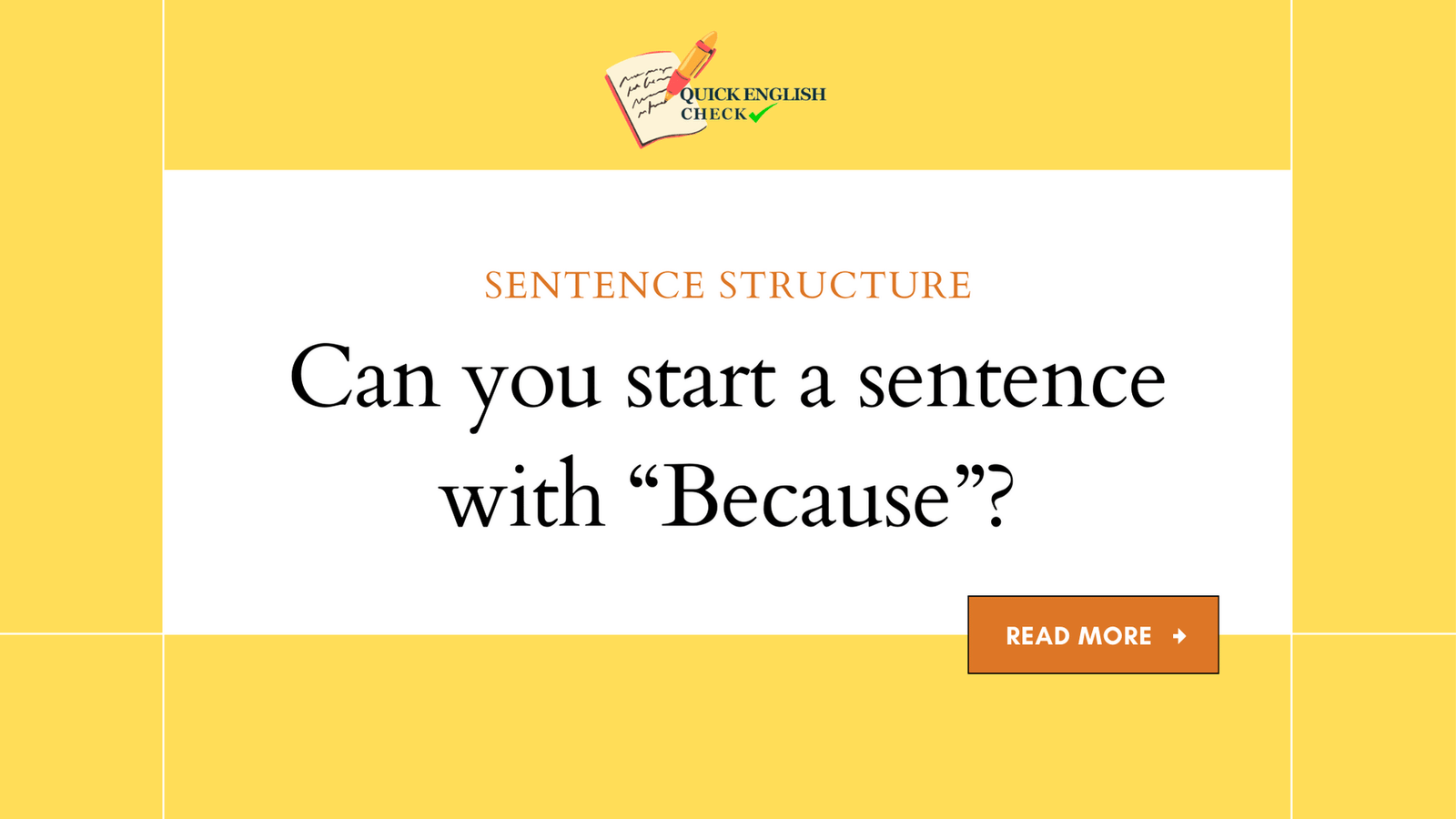Absolutely! Starting a sentence with “because” is not only grammatically correct but also a powerful way to express cause and effect, providing clarity and depth to your writing.
This common misconception stems from an outdated rule about complete sentences. However, when used correctly, “because” can kick off a sentence that stands both grammatically sound and stylistically strong.
Let’s break down how to use “because” effectively at the beginning of a sentence and explore 15 examples to get you started.
Understanding “Because”
“Because” is a conjunction that introduces a reason or a cause. It’s often followed by a clause that explains why something happened or justifies an action. The key to starting a sentence with “because” lies in ensuring that what follows is a complete idea. This means the sentence must have a subject and a verb, and it should be able to stand alone as a coherent thought.
The Power of “Because”
Starting a sentence with “because” can emphasize the reason behind an action or an outcome, making your writing more persuasive and engaging. It’s a straightforward way to draw your reader’s attention to the cause-effect relationship you want to highlight. Whether you’re writing an academic paper, a business report, or a casual blog post, “because” can add clarity and force to your arguments.
Examples of Starting a Sentence with “Because”
Here are 15 examples showing how “because” can be effectively used at the beginning of a sentence in various contexts:
- Because the weather was so bad, we decided to cancel the trip.
- Because of her expertise, she was chosen to lead the project.
- Because he practiced daily, his skills improved significantly.
- Because the conference starts early, we need to leave by 7 AM.
- Because they arrived late, they missed the first part of the show.
- Because of the increasing demand, we’re expanding our product line.
- Because she cares, she always goes the extra mile to help.
- Because the software was outdated, we experienced several issues.
- Because we value your feedback, we’ve made some important changes.
- Because the cake was left out in the rain, it was ruined.
- Because education is important, we should invest more in our schools.
- Because of his dedication, he quickly rose through the ranks.
- Because the team worked tirelessly, the project was a success.
- Because good communication is key, we’re introducing weekly meetings.
- Because health is wealth, adopting a healthy lifestyle is essential.
Tips for Using “Because” at the Beginning of a Sentence
- Ensure Completeness: Make sure the clause following “because” forms a complete thought.
- Avoid Fragmentation: Be cautious not to create sentence fragments. A common mistake is using “because” without providing a clear cause and effect.
- Mix It Up: While starting sentences with “because” can be effective, vary your sentence structures to keep your writing dynamic and engaging.
- Use Sparingly in Formal Writing: In very formal contexts, starting a sentence with “because” might be frowned upon. Consider your audience and the tone of your piece.
Using ‘Because’ in formal settings – Examples
Here are some examples of how “because” can be effectively used at the beginning of a sentence in formal contexts:
- Because of the recent market fluctuations, our company has decided to postpone the product launch.
- This sentence clearly states the reason for the company’s decision, linking it directly to market conditions.
- Because the research phase extended beyond the anticipated timeframe, the project deadline has been adjusted accordingly.
- Here, “because” introduces the cause for the project’s delayed timeline, making the sentence informative and straightforward.
- Because safety protocols were not followed, the facility has been temporarily shut down for inspection.
- This example uses “because” to highlight the importance of safety measures by showing the consequences of neglect.
- Because customer satisfaction scores have improved, the team will receive a bonus this quarter.
- Starting with “because” emphasizes the positive outcome (bonus) as a direct result of improved customer satisfaction.
- Because of her expertise in the field, Dr. Smith has been invited to keynote the international conference.
- The sentence effectively points out the reason for Dr. Smith’s invitation, attributing it to her recognized expertise.
- Because the legal requirements are stringent, we must ensure our documentation is thorough and precise.
- This sentence uses “because” to stress the necessity for meticulous documentation due to strict legal standards.
- Because funding was secured ahead of schedule, the research team can begin the next phase of development immediately.
- Here, “because” is used to convey a positive shift in the project timeline, directly linked to the early acquisition of funds.
- Because of unforeseen circumstances, the seminar scheduled for next week has been postponed.
- The sentence clearly communicates the cause (unforeseen circumstances) for the seminar’s postponement.
- Because transparency is a core value of our organization, we are committed to open communication with all stakeholders.
- Starting the sentence with “because” highlights the organization’s commitment to transparency as a fundamental reason for its communication policy.
- Because the data analysis revealed significant trends, the team is adjusting its strategy to capitalize on these insights.
- This example shows how “because” can introduce the basis for strategic adjustments, linking them directly to data analysis findings.

